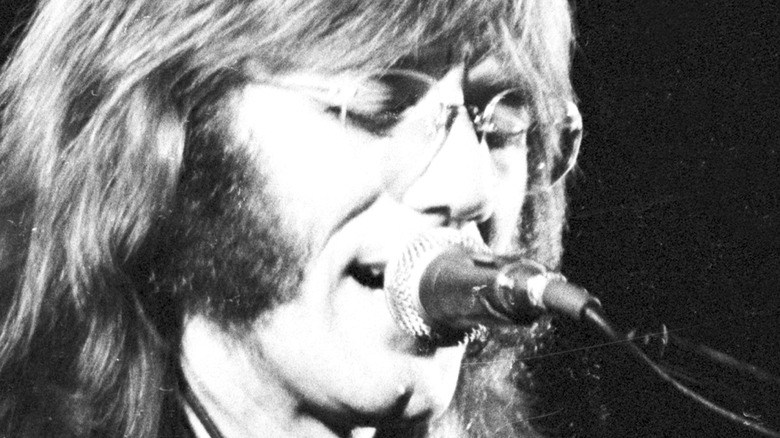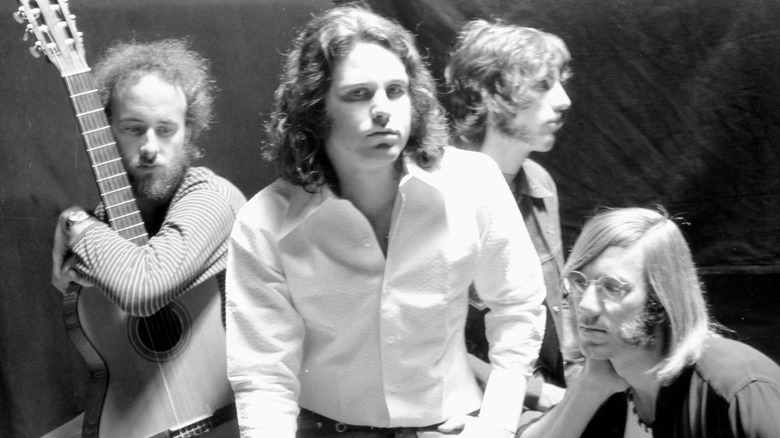The Tragic Death Of The Doors' Ray Manzarek
Music history was made in 1965 when Jim Morrison met with Ray Manzarek in Venice Beach, California. The two men knew of one another, but Morrison — a charismatic and handsome singer-songwriter and poet — and Manzarek, a classically trained keyboardist, would from that point form the nucleus for The Doors (via AllMusic). At the time that Manzarek died in 2013 at the age of 74, the keyboardist and songwriter was mostly known for the songs that he wrote for that legendary band he helped start (per TMZ). Few people realize that Manzarek had a productive post-Doors career, too, writing and working in music right up to the end.
As Rolling Stone tells it, Manzarek, who played piano from a young age, moved to Los Angeles from Chicago to study film at UCLA. There, he would meet Morrison, who was a fellow film student, for the first time. At that fateful beach meeting, Morrison recited his poems for Manzarek, and the two friends decided to write music together. Joining Manazarek and Morrison in The Doors would be drummer John Densmore and guitarist Robby Krieger. On timeless Doors hits like "Light My Fire," Manzarek brought both classical and jazz influences to the band, while his left hand in the keyboard's lowest register functioned somewhat like a bass player, since The Doors rarely used one either live on stage or in the studio.
Manzarek's time with The Doors
By 1966, The Doors were signed to Elektra records and well on their way to becoming rock stars, on the strength of songs like "The End," "Break on Through (To the Other Side)," and "Hello, I Love You," among many others (via AllMusic). Central to the band's sound was Manzarek's keyboard melodies and inventive arrangements. That, coupled with Morrison's lyrics and on-stage persona, helped make the band a success. By 1971, the light for the Doors seemed to go out, strained by Morrison's worsening alcoholism, substance use, and controversial on-and-off stage behavior. Because of this, Morrison left the band at that point and died in Paris just a short time later, per The Guardian.
Before Morrison's death, Manzarek and the band tried to carry on, releasing two post-Morrison albums, "Other Voices" in 1971 and "Full Circle" in 1972, but the group eventually fractured. They re-formed one more time for "An American Prayer" in 1978, featuring new music set to old recordings of Morrison reciting his poetry. On the post-Morrison Doors records, Manzarek told Rolling Stone, without their former lead singer, each remaining band member started off in a different direction. What made The Doors work was the perfect blend of four personalities that balanced each other out, Manzarek continued. "But [after Jim died] the whole dynamic was screwed up, because the fourth guy wasn't there," Manzarek said.
Manzarek had a long and productive career after The Doors
Although the end of The Doors closed the door on one of the most successful rock bands in music history, it was just the end of one chapter in Ray Manzarek's long and fruitful life in music. Manzarek went on to write and produce with a number of artists from a number of styles and genres including time he spent working with the Los Angeles punk band X, and minimalist classic composer Philip Glass, as The Guardian reports. Manzarek would also perform, record, write, and produce a number of other projects, including work with Robby Krieger, his former Doors bandmate. He also contributed to a "Weird Al" Yankovic cut, the Doors-like "Craigslist" (per AllMusic).
Manzarek also tried his hand as an author, releasing "Light My Fire: My Life With the Doors," and "The Poet in Exile," about a thinly-veiled Morrison stand-in who fakes his own death. In 1997, relations were strained between Manzarek, the remaining Doors band members, and the Jim Morrison estate when he released "The Doors: Myth and Reality," an oral history of his time in the band. As a result, Manzarek was sued by Densmore and the Morrison estate, and at the time that he died in 2013, Manzarek was no longer able to use The Doors name. His last album, "Translucent Blues," came out in 2011.
Manzarek died from bile duct cancer
As TMZ reports, Ray Manzarek died from bile duct cancer in Germany in 2013. Throughout his life, Manzarek remained idealistic about his former band, The Doors. In response to Oliver Stone's 1991 biopic, "The Doors" (per IMDb) Manzarek explained that Morrison, himself, and their former band mates were about freedom and brotherhood. Stone's movie failed to convey that. Via The Guardian, Manzarek said that Olive Stone "[M]ade Jim into an agent of destruction."
Otherwise, Ray Manzarek lived in California's Napa Valley growing fruits and vegetables as royalties from the band's album sales — at an estimated 35 million copies and counting, per The Wall Street Journal — provided Manzarek, his wife Dorothy, and his son Pablo a comfortable income. On the occasion of Manzarek's passing, Doors guitarist Robby Krieger offered a gracious tribute, as posted by Ultimate Classic Rock: "I'm just glad to have been able to have played Doors songs with him for the last decade. Ray was a huge part of my life and I will always miss him."



